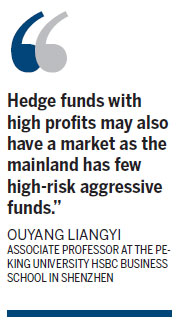Mutual recognition of funds in the cards
Updated: 2014-12-13 07:47
By Chai Hua in Shenzhen(HK Edition)
|
|||||||||
Mutual fund recognition between Hong Kong and the mainland is to be launched in Shenzhen, creating tremendous opportunities for the SAR's fund-management institutes, but analysts believe its overall impact will be limited in the short term.
Finance authorities and leading industry players from Shenzhen and Hong Kong held discussions earlier this month on the market's needs and how the plan is to be implemented, and sources said the policy will be carried out soon.
"Mutual fund recognition will create more market needs for fund management service companies," said Yang Delong, chief strategy analyst at China Southern Asset Management.
Song Liping, general manager of Shenzhen Stock Exchange, agreed. "It not only marks the opening of the capital market, but also the liberalization of trading management services. For the first time, mainland investors will have the opportunity to enjoy management services of international well-known asset management companies in Hong Kong," she said.
Industry experts are also optimistic that the various asset categories in Hong Kong will attract mainland investors.
"Through the channel, mainland investors can participate in bond and stock funds in the Hong Kong market, as well as those from the US, Europe and other oversea markets," Song stressed.

According to a survey conducted by China International Fund Management Co Ltd in August, the number of mainland investors who are optimistic about overseas funds had risen by more than 20 percent, and about 30 percent are willing to invest in foreign funds.
Growing interest by mainland investors may also attract more overseas funds to register in Hong Kong as industry sources speculate that only Hong Kong-registered funds are allowed to trade under the new channel.
Since the authorities began talks on mutual fund recognition, the number of Hong Kong-registered funds approved by the SAR's Securities and Futures Commission has been rising, according to industry analysts.
Luo Runhua, an analyst at Qianhai Finance and Science Institutes, told China Daily: "Mainland investors are attracted by Hong Kong-registered funds because they are more internationalized, and their market is much more segmented with more diversified finance products."
Besides the mainland's mainstream stock funds, bond funds and money-market funds, Hong Kong offers commodity funds, leveraged financial instrument warrants and derivatives funds.
Ouyang Liangyi, an associate professor at the Peking University HSBC Business School in Shenzhen, told China Daily: "Funds investing in blue chips in the Hong Kong stock market may become attractive because some conservative mainland investors do not need to invest directly in the stock market."
He said hedge funds with high profits may also have a market as the mainland has few high-risk aggressive funds.
However, Yang said that the impact of mutual fund recognition will not be as big as expected because its size needs to be further confirmed by the government.
In Hong Kong, there are only about 300 Hong Kong-registered funds, and only 30 of them are for retail investors.
Ouyang held the same view, saying: "After the Shanghai-Hong Kong Stock Connect program, which has linked up the two stock markets, mutual-fund recognition will not have the same impact."
grace@chinadailyhk.com
(HK Edition 12/13/2014 page8)